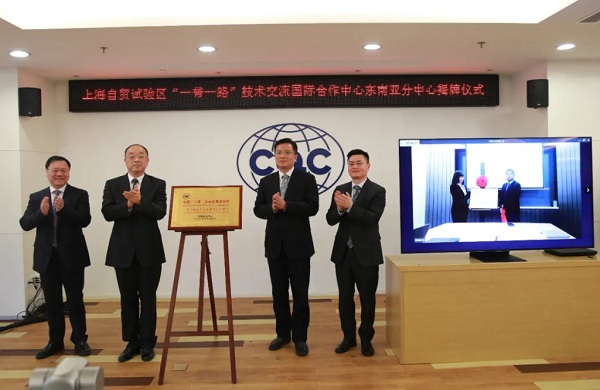Technology exchange center to help companies go out

Officials unveil the nameplate of the Southeast Asia Branch of the China (Shanghai) Pilot Free Trade Zone's Belt and Road Technology Exchange Center for International Cooperation in Pudong New Area, Shanghai on March 25. [Photo/WeChat account: pdnews]
The Southeast Asia Branch of the China (Shanghai) Pilot Free Trade Zone's Belt and Road Technology Exchange Center for International Cooperation was established in Pudong New Area, Shanghai on March 25.
Statistics show that China's foreign trade volume with ASEAN countries has accounted for 14.4 percent of the country's total. From January to February, China's exports to ASEAN countries were valued at 439.83 billion yuan ($66.94 billion), increasing 43.2 percent year-on-year.
Given this background, the Southeast Asia Branch will help domestic companies export products and expand operations overseas by establishing platforms and integrating resources.
The branch will also introduce a series of measures to push forward the mutual trust and recognition of testing results by various international institutions involved in the Belt and Road Initiative, aiming to effectively break technological trade barriers and remove restrictions on market access.
In addition, the branch will cooperate with the market regulation department in Pudong to carry out online training related to technical regulations in Southeast Asia and South Asia.
As early as 2018, the Belt and Road Technology Exchange Center for International Cooperation set up a Middle East branch in Dubai, and has issued thousands of certificates for products exported to the Middle East, including electronic products, electrical appliances, machinery equipment, and textile products.
An official from the China Quality Certification Center said that the Southeast Asia Branch will copy the experience of the Middle East branch under the framework of the Regional Comprehensive Economic Partnership to help accelerate the pace of domestic brands in expanding overseas market.
In recent years, Pudong has been working to promote the inspection and certification industry, as well as facilitate imports and exports.
The area is currently home to 248 inspection and certification institutions, with a total annual revenue exceeding 6 billion yuan. The area's high-tech service industry issues more than 3 million certificates in the Yangtze River Delta region, serving over 100,000 companies.


 China's public holidays for 2025
China's public holidays for 2025  Shanghai FTZ: Go all out to build China's first pilot zone for Silk Road E-commerce cooperation
Shanghai FTZ: Go all out to build China's first pilot zone for Silk Road E-commerce cooperation  Favorable policies boost 'China Travel' trend
Favorable policies boost 'China Travel' trend  play
play 